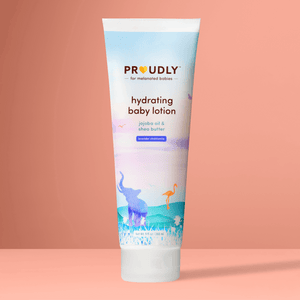This blog post is written by contributing writer Nicky Dawkins, CD, PPD, HHC. Learn more about our advising PROUDLY doula at the end of this article.
May is Mental Health Awareness Month, and we’re providing some great resources for mamas of color that can help year around. It's important to note that it is crucial to find a therapist, community group, or postpartum care provider who is culturally competent and understands the unique challenges Black and Brown mothers face. Our hope here at PROUDLY is that by providing accurate information, resources, and practical guidance, we can empower families of color to seek the help they need and deserve.
Postpartum Awareness Week
In 2018, a report from the CDC revealed that mental health conditions are a leading cause of maternal mortality. In an effort to continuously raise awareness about the mental health challenges women face during pregnancy and the postpartum period, I’m excited to share my experiences, insights, and resources with you during Postpartum Awareness Week (PAW) and beyond.
Taking place May 7-13 every year, the Postpartum Awareness Week campaign raises awareness about the inequitable and unacceptable impact of systemic racism experienced by Black and Indigenous people of color, especially during the birthing journey.
As a full-circle doula, I have supported countless women of color through their pregnancy, birth, and postpartum journey. While I have witnessed firsthand the joys and challenges of motherhood, I have also seen the impact that perinatal mental health challenges and lack of support during the postpartum period can have on new mothers and their families.
Maternal Health Resources for Mothers of Color
I hope this blog series will be a valuable resource for new mothers, their families, and anyone interested in learning more about maternal mental health from a doula's perspective.
Before diving in, I want to clarify the definitions of “postpartum” vs. postpartum mood disorders. Many people use the terms "postpartum" and "postpartum depression" interchangeably, which can be confusing.
- The term "postpartum" refers to the period immediately following a baby’s birth. That’s it! This postpartum period can last up to six weeks and is sometimes referred to as the "fourth trimester." As you know, this transition to motherhood can come with many physical and emotional challenges.
- “Postpartum depression” is a specific mental health disorder that can occur during the postpartum period. It is a type of depression that affects birthing people after childbirth, typically within the first year.
Unfortunately, Black mothers are at a higher risk of experiencing perinatal mental health challenges compared to other racial and ethnic groups. According to the Centers for Disease Control and Prevention (CDC), Black mothers experience postpartum depression at a rate of 25%, compared to 15% of all new mothers. In a report by Black Mamas Matter Alliance, Black women not only face a higher chance of developing perinatal mood disorders than white women, but are also less likely to receive treatment due to factors such as fear of stigma, involvement of child welfare services, and financial barriers.
Below are some helpful resources that support people of color in addressing their mental health needs during pregnancy and postpartum.
Direct Services
- Therapy for Black Girls is an online space dedicated to encouraging the mental wellness of Black women and girls. It includes a directory that helps Black women find culturally competent therapists in their area.
- Oshun Family Center provides racially concordant care to members of the Black community who are seeking to achieve optimal wellness.
- Frontline Doula Services is a perinatal health program connecting Black families with Black doulas.
- National Black Doulas Association is an organization that supports the work of Black doulas and seeks to improve birth outcomes for Black mothers and babies.
Community Support
- Postpartum Support International Alliance for People of Color bridges the gap in perinatal mental health support services for birthing persons, providers, and communities of color.
- Fertility for Colored Girls gives a voice to Black women struggling with infertility and loss by providing education, financial, and emotional support.
- Black Families Do Breastfeed aims to change the lives and narratives of Black families by promoting breastfeeding for our community through education, support, and advocacy.
- MochaMoms provides in-person and online support for women of color as they journey through all phases of motherhood while advocating for them nationally.
Support Hotlines
- Postpartum Support International (PSI) support hotline: 1-800-944-4773
- National Maternal Mental Health Hotline (HRSA): 1-833-943-5746 (1-833-9-HELP4MOMS)
- Substance Abuse and Mental Health Services Administration (SAMHSA) Suicide Prevention
- Lifeline: 988
- Crisis Text Line: Text HOME to 741741
Helpful Learning Tools
Advocacy Organizations
- Black Women’s Health Imperative focuses on promoting the health and wellness of Black women and girls through education, advocacy, and policy work.
- Black Girls Breastfeeding Club promotes breastfeeding and informed infant feeding decisions among Black women through research, education, and resources, and by centering the breastfeeding experiences of Black mothers.
- Shades of Blue aims to change how women of color are diagnosed and treated after giving birth and experiencing adverse maternal mental health outcomes.
- Sisters in Loss is a maternal child health education company dedicated to replacing silence with storytelling around Black pregnancy, infant loss, and infertility.
- Maternal Mental Health Leadership Alliance advocates for improved mental health care during pregnancy and postpartum.
- Policy Center for Maternal Mental Health (formerly Mom 2020) aims to ensure all pregnant and postpartum mothers have ready access to standardized, evidence-based maternal mental health care from providers they respect and trust.
Maternal Health Policies and Legislation
- Medicaid Postpartum Coverage Extension Tracker
- White House Blueprint for Addressing the Maternal Health Crisis
- Maternal Mental Health Federal Policy Blogs
PROUDLY is proud to create a safe space for our community and provide resources to support our littlest loves and their village of caregivers. So please, share the knowledge with your community, sisters, and friends. We love hearing from our PROUDLY Fam, so reach out if there is a topic you’d like us to cover in the future!
About Nicky Dawkins

Nicky Dawkins is a Holistic Reproductive Health Doula and Activist based in Miami, FL. She is the founder of Werk it Moms, a mom-driven organization that focuses on providing educational workshops, community events, and a safe space for mompreneurs and working mothers. In addition to this work, she is the founder of the Menstrual Market and has served as Vice Chair of the Miami Diaper Bank since 2018. She also serves on the board of No One Births Alone non-profit and others.
Nicky works with birthing people from fertility to postpartum and everything in between. Her passion is to help birthing people have a healthy period, pregnancy, and birth experience with as little intervention as possible. Nicky also works heavily in advocacy within the reproductive health and justice space, focusing primarily on menstrual equity, birth equity, and maternal mental health.
Certifications:
Vaginal Steaming Practitioner - Steamy Chick
Full Spectrum Doula - Mama Glow
Pregnancy & Infant Loss Support Doula - Nneka Hall, PSI
Breastfeeding Counselor - Healthy Start Coalition
Holistic Herbs Practitioner - Grandma’s Hands
Placenta Encapsulation Specialist - Women’s Choice Prenatal
Menstrual Health Coach - Nicole Jardim Fix Your Period
Cannabis Doula Practitioner - The Cannabis Doula and Trichome Institute
Women’s Hormone Health Coach - Menstrual Health Institute
Maternal Mental Health Certification - Postpartum Support International










